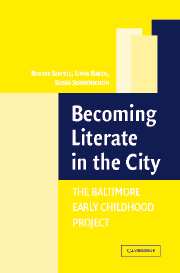Book contents
- Frontmatter
- Contents
- Preface
- 1 Early Appropriation of Literacy in Sociocultural Context
- 2 Growing Up in Baltimore : The Early Childhood Project
- 3 The Intimate Culture of Children's Homes
- 4 Processes of Literacy Enculturation in the Home
- 5 The Development of Literacy Competencies and Orientations
- 6 The Agenda and Practices of Schooling
- 7 Relations Between Homes and Schools
- 8 Conclusions and Implications for Policy and Practice
- References
- Name Index
- Subject Index
1 - Early Appropriation of Literacy in Sociocultural Context
Published online by Cambridge University Press: 17 December 2010
- Frontmatter
- Contents
- Preface
- 1 Early Appropriation of Literacy in Sociocultural Context
- 2 Growing Up in Baltimore : The Early Childhood Project
- 3 The Intimate Culture of Children's Homes
- 4 Processes of Literacy Enculturation in the Home
- 5 The Development of Literacy Competencies and Orientations
- 6 The Agenda and Practices of Schooling
- 7 Relations Between Homes and Schools
- 8 Conclusions and Implications for Policy and Practice
- References
- Name Index
- Subject Index
Summary
Becoming literate involves the gradual assumption of ownership of a system of meanings that enables people to communicate through written texts. Human societies have generated a number of such systems over the course of history. These include not only languages and scripts, such as those in which the present text is printed, but also a wide range of structured activities, such as reading for entertainment, studying at a university, publishing a newspaper, sending E-mail, and so on. The social functions of these various activities collectively define the cultural practice of literacy, and the appropriation of the system of meanings informing that practice is a prerequisite for full membership in a literate society.
The importance that industrialized societies place on children becoming literate is reflected in the hours that children are expected to spend in school. Becoming literate is regarded as an essential part of growing up. Nevertheless, many children in literate societies such as the United States struggle to learn to read, and a sizable percentage fail to master all but the most basic skills (U.S. Department of Education, 2001). The demographic profile of the group of children who fail to become literate includes an over-representation of children growing up in low-income families and children of African or Hispanic heritage.
Adults in industrialized societies who do not achieve individual literacy are seriously marginalized in many ways. However, this was not always the case in America, nor is it true of a number of contemporary communities around the world.
- Type
- Chapter
- Information
- Becoming Literate in the CityThe Baltimore Early Childhood Project, pp. 1 - 24Publisher: Cambridge University PressPrint publication year: 1958

